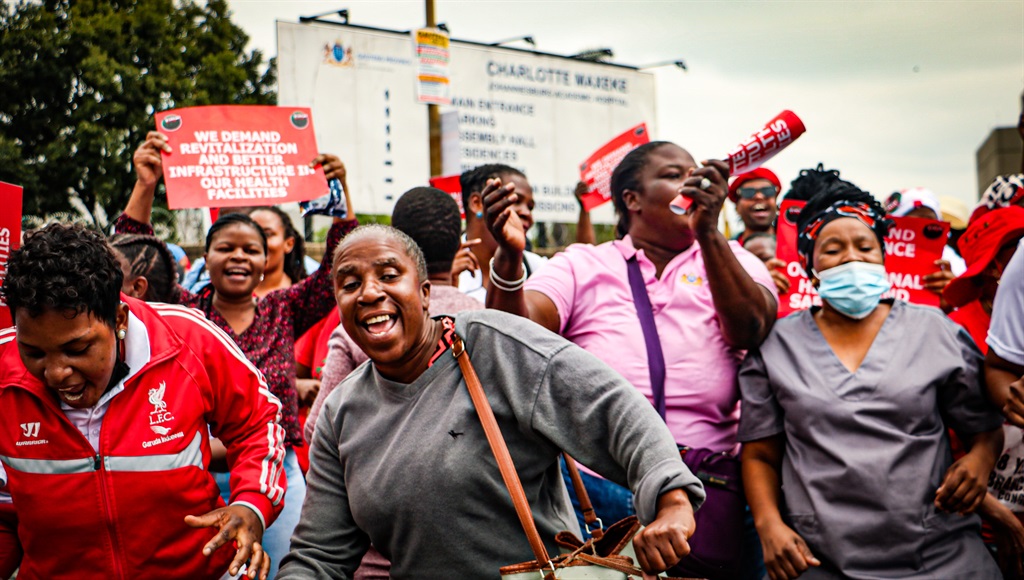
After struggling to access healthcare for her elderly aunt at a public hospital during the Nehawu strike, Mapi Mhlangu writes public servants should prioritise the needs of the people they serve and ensure access to healthcare is a right and not a privilege reserved for those who can afford it.
My heart goes out to the thousands of South Africans who have been unable to receive medical care due to the ongoing National Education, Health and Allied Workers' Union (Nehawu) strike.
I have been caring for my mother's younger sister, an 82-year-old woman who does not have medical aid and suffers from chronic illnesses such as diabetes, high blood pressure, and arthritis.
My elderly patient lives in Soweto Emdeni, and we have been lucky to have a good relationship with Chris Hani Baragwanath Hospital.
The hospital has developed a comprehensive care plan for her, including medication management, regular check-ups, and addressing emotional factors affecting her health, such as social isolation or depression.
But it has been a challenging experience during the Nehawu strike, which has made it difficult for many South Africans like her to access the public healthcare they need.Last Monday, doctors at Bara had to sneak her into the hospital due to concerns about her health, and she was treated in darkness because of the threat posed by striking workers. Unfortunately, they could not provide her medication as the pharmacy was closed.
On Sunday morning, I received a distressing call from my aunt, who was in excruciating pain. A neighbour offered to take her to a local clinic, but they found no workers available.
As a result, we had to take her to a private facility, the Netcare Waterfall City Hospital and pay with a credit card. My heart goes out to those patients who cannot even borrow money to seek alternative medical assistance.
I paid an arm and a leg for it to save the life of my elderly patient. She is out of the woods for now, but at what cost?
To get her to the emergency ward, I had to spend R2 500. On top of that, I paid R4 100 for a CTG scan and R1 900 for medication, bringing the total hospital visit cost to R8 500. The prices of private healthcare are exorbitant even for the middle class. My heart breaks for those who can't afford to pay for healthcare out of their own pockets.
It reminds me of a powerful quote from Amilcar Cabral, a revolutionary and writer from Guinea-Bissau and Cape Verde, about the role of civil servants in serving the people.
Cabral once said:These words ring true in our current situation, where public servants must prioritise the needs of the people they serve and ensure access to healthcare is a right and not a privilege reserved for those who can afford it.
The impact of the Nehawu strike on the healthcare system has been devastating, and we cannot afford to ignore the urgent need for change. We must address the root causes of this crisis and work towards a more equitable and sustainable healthcare system for all.
Health Minister Joe Phaahla has already reported fatalities directly linked to the strike, making it clear public hospitals have turned into crime scenes since last week.
We must support those affected by the strike by volunteering, donating, or advocating for change in the short term. Additionally, we must demand greater accountability from our government and civil servants and push for systemic changes that prioritise the needs of the people over political agendas.
In light of this crisis, I extend my deepest sympathies to all those affected and my heartfelt gratitude to all those working tirelessly to support the most vulnerable members of our society.On Monday, the Labour Appeal Court interdicted any industrial action by Nehawu.
The court ruled Nehawu's members and all essential service employees are prevented from continuing with or participating in any strike, picket, or industrial action.
We welcome this decision as a step towards resolving this crisis and ensuring all South Africans have access to the necessary medical care.
- Mapi Mhlangu is MD of MInsight Content Creation and former MD and editor-in-chief of eSat Tv.*Want to respond to the columnist? Send your letter or article to opinions@news24.com with your name and town or province. You are welcome to also send a profile picture. We encourage a diversity of voices and views in our readers' submissions and reserve the right not to publish any and all submissions received.
Disclaimer: News24 encourages freedom of speech and the expression of diverse views. The views of columnists published on News24 are therefore their own and do not necessarily represent the views of News24.


